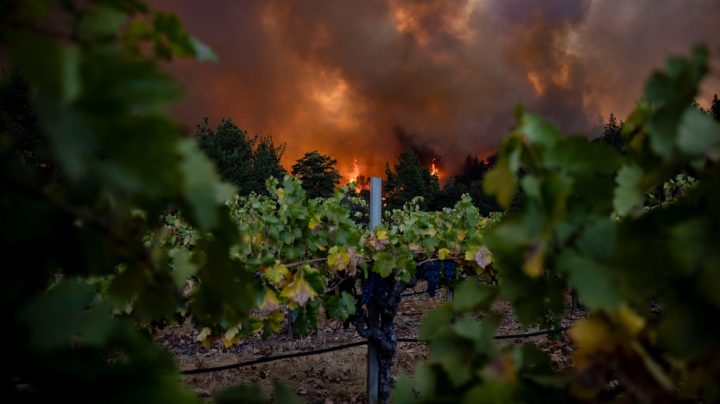
Napa Valley’s vineyards are in “climate crisis,” winemaker says
Napa Valley’s vineyards are in “climate crisis,” winemaker says

The effects of the climate crisis are appearing all over the world, and California is no exception.
California’s water year from October 2020 to September 2021 was the driest in nearly a century. Napa Valley, a region famous for its wines situated north of the San Francisco Bay Area, saw record temperatures of about 115 Fahrenheit last month, and wildfires in the West are more frequent and intense than ever.
California is a massive food producer — a third of the country’s vegetables and three-quarters of its fruits and nuts are grown there. And the changing climate has changed farming practices. One sector that’s trying to adapt quickly is wine. Vineyards have reported that as the heat and water cycles change, so does the taste of their grapes.
Avery Heelan is a winemaker at Larkmead Vineyards in the Napa Valley town of Calistoga. She joined Marketplace’s Kai Ryssdal to talk about what she’s seeing in Larkmead’s fields and how it’s preparing for the future. An edited transcript of their conversation is below.
Kai Ryssdal: Tell me what you are seeing on the ground versus, like, three, four years ago.
Avery Heelan: Yeah, absolutely. I think if you’ve been in the Valley for the last five years, you certainly are identifying that this is not just climate change, but definitely a climate crisis. Just this year alone, we’ve clocked in at about 120 degrees a couple of weeks ago. So higher warms, natural wildfires happening and very, very little rain.
Ryssdal: What does that do to your product? Because, I mean, I’m a beer guy, but the little I know about wine, it’s all about temperature, sunshine and the Earth, right? What is that doing to your product?
Heelan: Cabernet sauvignon is kind of the wheelhouse of the Napa Valley. And they’re pretty resilient vines, but not when it gets to these high extremes. So what you’re gonna see in the future is lower color in our finished wine, lower acid coming in on chemistry, and it’ll just affect the ripening days overall.
Ryssdal: Is that going to make a bottle of Larkmead cabernet more expensive for me?
Heelan: I hope not. Larkmead is pretty unique in that we’re pretty in tune with climate change here. And we’ve been planning for this for a while. We’ve planted 3 acres’ worth of different varieties that are grown in hotter climates than the Napa Valley. So, pulling from the Mediterranean area, from Portugal, from South Africa, we’ve planted a white chenin blanc. So what we’re hoping to do is have some blending components in the future for things that cabernet might lack.
Ryssdal: As talented a winemaker as you are, though, this is not entirely in your control, right? Might there come a day when you say, “You know what? This is what Larkmead cabs taste like now”?
Heelan: I mean, certainly if you sign up to be a winemaker or work in any type of agriculture, you don’t pretend that anything is in your control. So in addition to planting these other varieties, we’re attempting to farm a little bit differently. We are using something called shade cloth for preventing, kind of, sunburn. And we’ve also installed some sprinklers or mister systems that go above the vines. And just like you sitting on the patio, we can kind of cool the grapes down immediately.
Ryssdal: I get that you’re the winemaker, not the chief financial officer at the winery. But obviously, this is an expense, right? This is an input expense to the eventual cost of a bottle of Larkmead cab, right?
Heelan: We’re pretty fortunate that we’ve been family-owned for over 125 years. I think if we were working for a corporation, and we didn’t have that kind of love and attention that comes with a family-owned company, they probably wouldn’t be willing to make these huge financial investments. But certainly, yeah, they are.
Ryssdal: Yeah, I’m sure you’re familiar, and a lot of people are probably familiar with sort of the arc of history of the Napa Valley on the global wine scene, right? In the ’60s and ’70s, it kind of explodes, and everybody goes, “Oh my God, they can make wine in California!” And the French get all, you know, insulted or whatever. Apologies to my French friends. I wonder if — well, this is kind of a sad question, but I kind of have to ask it. I wonder if it’s a little sad for you that maybe the moment in the sun for Napa Valley is time-limited because of the way the climate is changing?
Heelan: I mean, don’t give up on us yet.
Ryssdal: I won’t, I promise.
Heelan: This is kind of a 20-year conversation. So will we be able to farm in the same way? Probably not. But I think there’s a lot of potential to kind of educate ourselves, experiment with new practices, new varieties, and hopefully prolong the Napa Valley.
There’s a lot happening in the world. Through it all, Marketplace is here for you.
You rely on Marketplace to break down the world’s events and tell you how it affects you in a fact-based, approachable way. We rely on your financial support to keep making that possible.
Your donation today powers the independent journalism that you rely on. For just $5/month, you can help sustain Marketplace so we can keep reporting on the things that matter to you.












